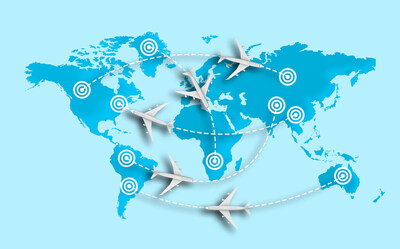
Airport slot co-ordination is an intriguing science; the allocation of slots is highly competitive and the top slots fiercely guarded. Artemis Aerospace investigates how airline slots are apportioned.
WISTON, England, Aug. 13, 2024 /PRNewswire/ -- As you follow a flight on Flightradar or gaze up at contrails criss-crossing a clear blue sky, have you ever wondered exactly how aircraft slots are organised? It may be that you thought it's a global free-for-all, and that any airline can decide to put on a flight from Heathrow to Sydney whenever they felt like it, and if they then change their mind and want to go from Gatwick to Melbourne there's nothing to stop them from doing that. Well, you'd be wrong - each and every flight worldwide from a major airport has to stick to its allocated slot.

An airport slot is simply permission to use the airport infrastructure such as the runway, gates and terminal building, on specific dates and at specific times to enable an aircraft to take off or land. Slots are issued under guidelines released biannually by the International Air Transport Association (IATA) Worldwide Airports Slots Group after consultation with airlines and other stakeholders. Their intention is to provide fair access and the necessary coordination to all airlines and promote safety and effectiveness at the busiest airports.
In the UK, slots are then allocated by the operator and airport-funded company Airport Coordination Ltd (ACL), which was the world's first independent slot coordinator, and which assigns slots for winter and summer travel.
There are three levels of this coordination:
- Level 1 - no coordination needed as the airport capability is usually adequate to meet demand.
- Level 2 - coordination is mutually agreed with airlines as there is potential for congestion at peak times.
- Level 3 - an airport where its ability to handle flights is considerably exceeded by demand on its services; all airlines and operators have slot allocations.
IATA holds a conference twice a year to decide on slots which is attended by over 400 representatives of airports and operators, all of whom are jockeying for slots which will enable them to grow their aviation business in the most advantageous way.
As slots are limited and many are in great demand, some airlines used to acquire them in order to assert their dominance over a particular route, blocking competition but not actually using them themselves. This practice was banned by the introduction of a series of rules, the main one of which is the 80/20 'use it or lose it' rule. This states that airlines must use at least 80% of their slot allocation per airport, and if they fail to do this the slot will be given to another airline. During major global crises such as the Covid pandemic, however, these rules were temporarily suspended.
According to IATA, there are more than 200 Level 3 airports worldwide, and around 50% of all airline passengers depart from a Level 3 airport, with 35% of all flights operating between two Level 3 airports.
London Heathrow is the UK's biggest airport and the fourth busiest in the world, serving nearly 80 million passengers in 2023 - it's also the holder of some of the most valuable slots in the world. ACL's data for the winter season 2023-2024 shows that British Airways held 4779 slots at Heathrow, by far the largest number and over half the total number of slots allocated. In second place by a very long way comes Virgin Atlantic with 392 slots. Lufthansa is third with 290, Aer Lingus fourth with 288, United Airlines fifth with 278 and American Airlines sixth with 270.
The desirability of a slot can wax or wane depending on the popularity of a specific destination. Winter and summer travel show obvious differences, and slots which dovetail neatly with commercial travellers' needs are always high on the popularity list. Sometimes more unusual reasons can trigger a slot demand, such as 'screen tourism' - Aer Lingus acquired a new slot from Ireland West Airport to Heathrow after the film 'Banshees of Inisherin' showcased the beauty of the west of Ireland.
The shortage of slots means that competition is fierce for the most profitable ones. Although IATA does not promote sale or bidding wars, it permits airlines to trade slots, or lease them if they aren't utilising them, as otherwise they would be forfeited. One legendary trade took place in 2016 when Oman Air bought a pair of Heathrow slots from Air France-KLM for US$75 million. Bargains are also to be had in the wake of global events - Aeroflot's ban from Heathrow after the invasion of Ukraine meant a field day for the six airlines which picked up around 1300 slots.
Slot allocation is intended to prevent delays, safeguard passengers and ensure the optimum passage of aircraft in and out of the airport - so when you next glance up and spot an Airbus winging its way across the sky, think of the complex transactions which allowed it to get there.
Photo - https://mma.prnewswire.com/media/2476477/Artemis_Aerospace_Slots.jpg
![]() View original content:https://www.prnewswire.co.uk/news-releases/artemis-aerospace-explores-the-history-of-airline-slot-allocations-302215712.html
View original content:https://www.prnewswire.co.uk/news-releases/artemis-aerospace-explores-the-history-of-airline-slot-allocations-302215712.html

